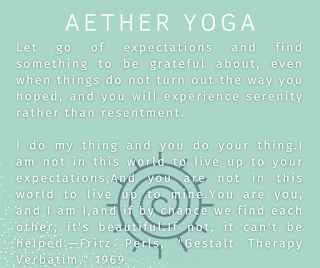Why Does Yoga Make You Feel Calm?
Why Does Yoga Make You Feel Calm?

You're probably familiar with the experience of leaving a yoga class, feeling as if a giant weight has been lifted off your shoulders. It's no secret that yoga makes you feel calm, but you may have wondered why the stretching, the meditating, the deep breathing, makes you feel so calm.
Yoga is the practice of non-competitive, physical exercise involving held poses (in Sanskrit, asana) combined with regulated breathing (pranayama) and meditation techniques. The past few decades have seen a great increase in the practice of yoga in the West.
Multiple studies point to the positive effects of yoga on mental and physical health, as well as on personal development. Yoga alleviates chronic pain. It helps manage coronary artery disease, asthma, diabetes, and lymphoma. Yoga helps individuals suffering from mental health problems, such as depression, anxiety, obsessive-compulsive disorder, and post traumatic stress disorder.
Regular yoga practice also benefits healthy individuals, improving psychological well-being, satisfaction with life, and self-esteem, and reducing stress and performance anxiety. Studies have also found that yoga reduces fatigue and negative affect, while increasing positive affect and giving a feeling of being energised.

Yoga — which is believed to have been around for several thousands of years — combines controlled, deep breathing, a series of stretches, and mindfulness. The goal of yoga is to create a sense of harmony and connection between your spirit, mind and body. One of the most sought after benefits of yoga (by both participants and medical professionals treating patients) is the tranquility and clarity it fosters. And though some people attribute that sense of calm to the age-old mysticism of the practice, science is beginning to determine exactly why yoga makes us feel calmer, and what effect it has on our minds.
Yoga makes you feel more calm and relaxed because we use breathing techniques, such as diaphragmatic breathing — also called Ujjayi breath — that helps to take us out of the sympathetic nervous system, and moves us into our parasympathetic response (aka, rest and digest).
The sympathetic nervous system is one half of the autonomic nervous system (ANS), and is responsible for triggering what’s commonly known as your fight or flight response to stress. The other half of the ANS is the parasympathetic nervous system, which promotes healthy digestion and relaxation. Studies have shown deep and diaphragmatic breathing, like practiced in yoga, can be extremely effective in controlling this stress response.
Research has even shown trauma-sensitive yoga can be beneficial for people with post-traumatic stress disorder (PTSD) — a mental illness characterized by the overactivation of the sympathetic nervous system. Your physiology is at ease through this act [of diaphragmatic breathing], which is why it may be so helpful to even those with mental health issues.

What’s more, like most forms of exercise, CNN reported yoga can boost your body’s production of two hormones essential to cultivating happiness, health, and feelings of calmness. Oxytocin, aka “the cuddle hormone,” can make you feel closer to your loved ones, decrease your stress, and improve your overall wellness. Endorphins are another type of hormone that’s released when you practice yoga; similarly to oxytocin, endorphins play an important role is managing physical pain and negative emotions.
Furthermore, studies have even found different types of yoga can increase your body’s melatonin production — a hormone that, according to the National Sleep Foundation, helps regulate your sleep cycle. So, with all three of these hormones in play, it’s no surprise that yoga creates a feeling of inner peace, and stillness.
Another aspect of yoga that's responsible for the sense of calm it gives many people is the incorporation of mindfulness and meditation in the practice. The mindfulness approach [to yoga] helps to take the focus out of the mind and whatever may be causing stress, and brings the focus to your body. How many of us feel like we’re all consumed — especially under stress — and that we only exist in our thoughts? Yoga helps to create balance [between mind and body].

Overall improving our mood and even healing ourselves from anxiety and depression. The yoga high seems to be the direct result of increasing the feel good neurochemicals and neurotransmitters in our brain, almost like a drug, giving us a natural and safe “buzz”.


